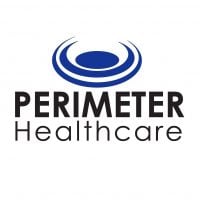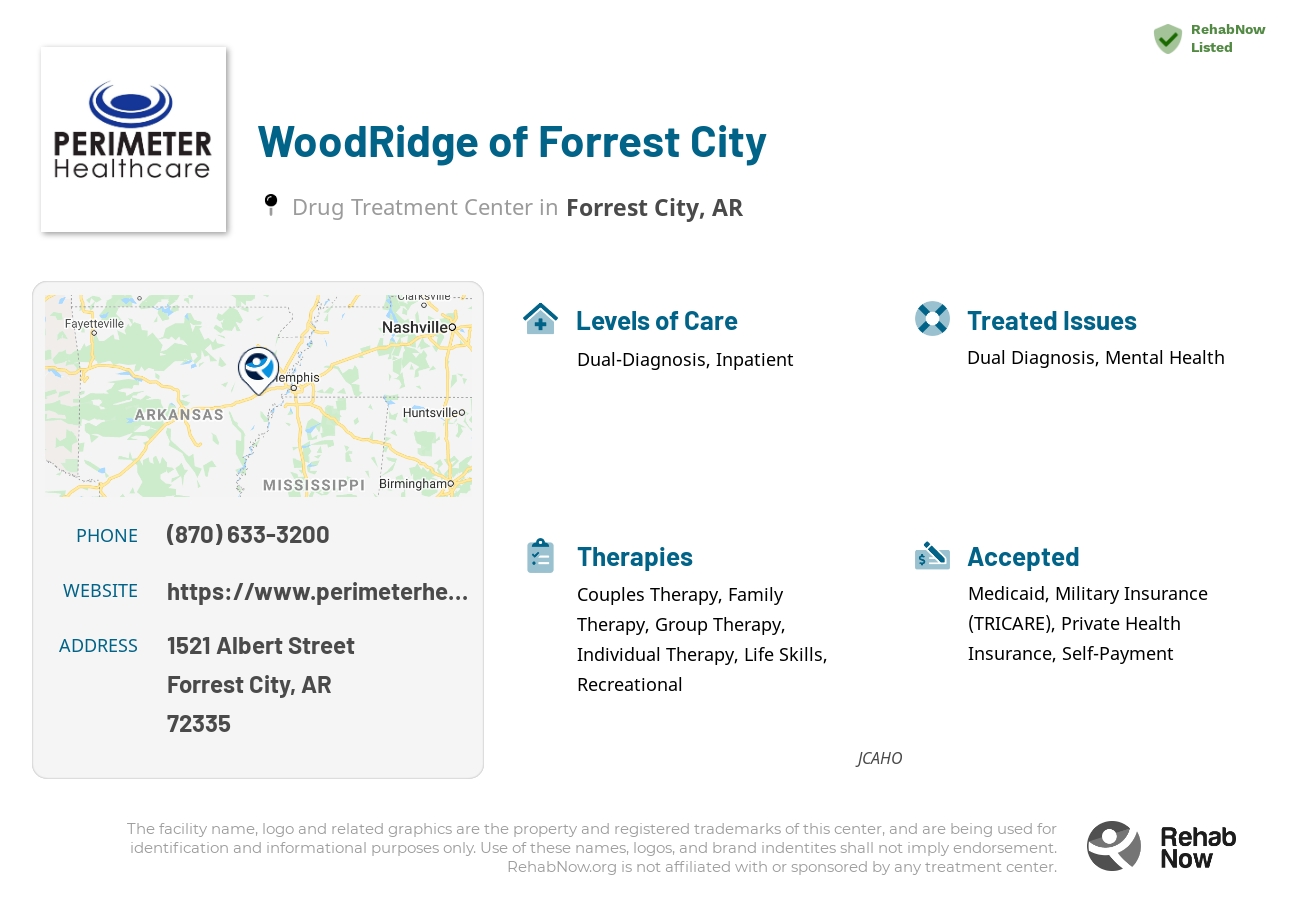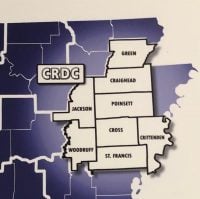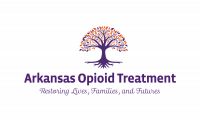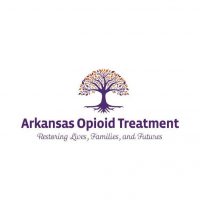WoodRidge of Forrest City
Drug Rehab Center in Forrest City, Arkansas
WoodRidge of Forrest City in Arkansas is a gender-specific addiction treatment facility offering an individualized approach to treatment, including medical care, therapeutic services, and relapse prevention education with the goal of achieving long-term sobriety.
About
WoodRidge of Forrest City in Forrest City, Arkansas is a 48 bed addiction treatment facility that offers a wide range of services to those suffering from addiction and dual diagnosis. The staff at WoodRidge is dedicated to providing a compassionate and safe environment to help individuals recover from substance use and co-occurring disorders. Their specialized treatment programs include both inpatient and outpatient levels of care, in addition to dual-diagnosis treatment. As an accredited facility by JCAHO, WoodRidge of Forrest City is equipped to handle a variety of services, from nutritional counseling and medication management to cognitive behavioral therapy and individual and group counseling. They also accept private health insurance to cover the cost of their services.
At WoodRidge of Forrest City, their team of professionals is dedicated to providing high-quality care for individuals looking to recover from addiction and substance abuse. The treatment programs are designed to help individuals address psychological, physiological and spiritual needs in order to establish a comprehensive treatment plan. The facility also uses evidence-based and holistic treatment methods to ensure individuals are supported in their recovery journey. WoodRidge of Forrest City is also affiliated with Perimeter Behavioral Hospital for additional support and resources as needed.
Genders
Ages
Modality
Additional
Accreditations

JCAHO
Conditions and Issues Treated
A person who struggles with addiction and a mental health condition suffers from a dual diagnosis. This means that they have two issues that must be treated. The specific mental health issues that the patient at WoodRidge of Forrest City might have include but are not limited to:
- Depression
- Bipolar Disorder
- Anxiety
- PTSD (Post Traumatic Stress Disorder)
The specific addiction issues that the patient might have include but are not limited to:
- Alcoholism
- Drug Addiction (i.e., Cocaine, Meth, and other stimulants, Marijuana, and Ecstasy)
The combination of the two illnesses can be tough to treat. Taking care of one or the other is tough, and taking care of both cannot be done alone. A patient who receives dual diagnosis treatment will be given the best chance at becoming sober.
Levels of Care Offered
This center offers a variety of custom treatment tailored to individual recovery. Currently available are Dual-Diagnosis, Inpatient, with additional therapies available as listed below.
Inpatient treatment centers offer a safe, secure, and often medically supervised environment for drug or alcohol-addicted individuals. Many of these facilities are equipped to provide detoxification, treatment for co-occurring mental health disorders, and aftercare programs.
The patient typically spends 28 to 30 days at the facility and will receive extensive drug counseling. They will also learn how to live without drugs and how to make the right decisions in life.
Therapies & Programs
Individualized Treatment is essential because it gives addicts the ability to participate in a program that meets their unique needs. An addict should work with professionals who understand what they’re going through, especially if the addict is actively using. Finding the right treatment program for an addict is difficult, but it’s even harder without communicating with those who have experience treating your specific situation.
Couples therapy is a treatment approach where the patients and their partners are engaged together. When a person becomes a victim of substance abuse, it affects the patient and his people, particularly his partner. Their relationship can become strained due to lack of communication, financial issues, loss of trust, lack of intimacy, and physical abuse in more severe cases. Couples therapy addresses these issues and tries to rebuild the trust between the partners. The partner’s involvement in the process will result in greater chances of treatment success and sustained recovery.
The therapies typically involve all family members, potentially including siblings, children, and parents who play a role in their daily lives. These sessions can be essential because they address past issues that may have affected an addict or alcoholic’s recovery process. They provide support during this time when it is needed most!
A family therapy session, often called a family meeting or intervention, is a necessary process that helps loved ones of addicts see their situation in a new light. It’s also one of the most challenging things families will ever have to do when they’re facing a loved one battling addiction or alcoholism.
Group therapy sessions provide recovering addicts with a chance to cope with everyday situations that many face. Group therapy sessions are held in rehab facilities, clinics, churches or community centers that offer drug addiction treatment.
People who attend these groups are encouraged to voice their feelings and support other addicts in recovery. This helps group members strengthen their own recovery program while cheering on others who are struggling with sobriety.
Cognitive Behavioral Therapy (CBT) is a highly effective treatment option based on the idea that how we feel, think and act all interact together. Our thoughts determine our feelings and behaviors; our feelings affect our thoughts, and our behaviors change our thoughts and feelings. CBT helps people explore their thoughts for problems (or false beliefs) that influence their mood and actions. By examining their thoughts and beliefs, people can recognize distorted or irrational and modify them to more realistic, positive ones. CBT is very goal-oriented, which means that the therapist and patient work together on a specific problem while learning to become more adept at solving future problems.
CBT works well with a broad range of people, including those with depression, anxiety disorders, eating disorders, and problems with anger. In addition to helping a client focus on thoughts that can be changed, CBT also allows them to take an active role in their treatment. This is called a collaborative approach because both patient and therapist work together to produce the best possible results.
CBT is based on cognitive learning theory, which says that our behavior is a learned response to our environment. Cognitive refers to thoughts and beliefs, while behavioral relates to actions or deeds. CBT helps people learn ways of behaving to improve their quality of life by focusing on specific problems or goals they want to achieve. Sometimes, CBT is used alone; other times, it is combined with medications or brief counseling techniques such as solution-focused and motivational interviewing to achieve optimal results for the patient.
Life skills training is beneficial for addicts in recovery because it helps them learn how to take care of themselves and improve their quality of life, which can promote feelings of purpose and motivation.
This works by teaching individuals life-enhancing skills that support positive living, including:
- Healthy lifestyle habits
- Skills to effectively manage stress
- Effective communication skills to help them get their needs met without turning to drugs or alcohol
- Money management and budgeting skills so they can continue to take care of themselves after treatment ends.
Payment Options Accepted
For specific insurance or payment methods please contact us.
Is your insurance accepted?
Ask an expert, call (888) 674-0062
Perimeter Behavioral Hospital Associated Centers
Discover treatment facilities under the same provider.
Learn More About Perimeter Behavioral Hospital Centers
Additional Details
Specifics, location, and helpful extra information.
Forrest City, Arkansas 72335 Phone Number(870) 633-3200 Meta DetailsUpdated November 25, 2023
Staff Verified
Patient Reviews
There are no reviews yet. Be the first one to write one.
Forrest City, Arkansas Addiction Information
Arkansas has one of the highest rates of substance abuse and addiction in the nation for drug overdoses. Methamphetamines and prescription opioids are by far the most widely abused drugs in the state. Despite the high rates, Arkansas ranked only 25th in the for drug overdose deaths in 2013.
Forrest City, AR has one of the highest rates of drug-related fatalities in the state. Approximately 1,000 people in Forrest City are addicted to drugs. This is likely due to the high levels of addiction and abuse of drugs such as methamphetamines, heroin, and cocaine. There are many drug rehab centers in Forrest City, Arkansas. They offer various treatment options, such as inpatient and outpatient programs, 12-step programs, and detox.
Treatment in Nearby Cities
- Paris, AR (168.3 mi.)
- Ash Flat, AR (95.8 mi.)
- Marianna, AR (16.8 mi.)
- Osceola, AR (65.8 mi.)
- Lamar, AR (150.6 mi.)
Centers near WoodRidge of Forrest City
The facility name, logo and brand are the property and registered trademarks of WoodRidge of Forrest City, and are being used for identification and informational purposes only. Use of these names, logos and brands shall not imply endorsement. RehabNow.org is not affiliated with or sponsored by WoodRidge of Forrest City.
